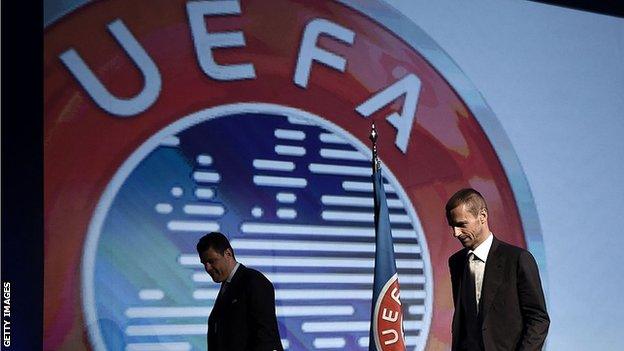Uefa proposes new spending rules to replace Financial Fair Play
- Published

Uefa is hoping to introduce a cap on spending of 70% of clubs' revenue from 2025
Proposed new spending rules to replace Uefa's current Financial Fair Play (FFP) regulations would limit club spending on wages, transfers and agents' fees to 70% of their revenue from 2025.
If agreed, the plans will be phased in from 2023, when clubs will be allowed to spend 90% of their income, reducing to 80% in 2024 and 70% a year later.
Europe's top clubs will be updated on the new spending rules at the European Clubs Association's (ECA) two-day meeting in Vienna this week.
Crucially, the plans, that are being put together by Uefa and the influential ECA also double the permitted losses over a three-year period from €30m (£24.98m) to €60m (£49.96m), providing they are covered by cash injections.
The idea is to address complaints that the current system protects the biggest clubs by limiting additional owner investment, although many have also been uneasy at the 'artificial' funding of what La Liga president Javier Tebas has dubbed 'state' clubs, such as Paris St-German and Manchester City.
It is thought new, reinforced punishments, including points deductions, demotion to lower-ranking competition and potential exclusion from European football completely, will be introduced as part of the new regulations.
In his new role as ECA chairman, PSG president Nasser Al-Khelaifi is due to speak to the media on Tuesday after his organisation's meeting. As one of the clubs who could benefit from additional investor funding, his thoughts will be monitored with interest.
Newcastle are an associate member of the ECA and it will be observed with interest whether the Magpies are represented in person on Monday at the first General Assembly of the ECA since the Saudi-backed takeover of the club in October.
In addition to FFP, ECA clubs attending the General Assembly in Vienna will also be updated on the situation in Ukraine from a football perspective.
The country's World Cup play-off with Scotland has been delayed until June, although there has been no clarification from Fifa about what will happen if Ukraine are unable to play at that time.
There is also likely to be further debate around the two Champions League slots due to be allocated for the 2024-25 season onwards to clubs with the highest coefficient that have not qualified directly for the competition but have for a different European competition.
If the controversial concept had been in place this term and the current standings remained as they are, Manchester United and Roma would be the beneficiaries even though both clubs are sixth in their domestic leagues.
In the Premier League, Tottenham are fifth, but would remain in the Europa League, as would Atalanta in Serie A.
What are the current FFP rules?
Currently, clubs can spend up to €5m more than they earn per three-year assessment period. However they can exceed this level to a limit of €30m, if it is entirely covered by a direct contribution/payment from the club owner(s) or a related party. According to Uefa, the idea of this was to 'prevent the build-up of unsustainable debt'.
Uefa has a wide-ranging list of potential punishments for clubs who break these rules, from a warning to loss of European titles. In 2020, Wolves were fined €200,000 and given a 23-man squad limit instead of the usual 25 after breaching Uefa's FFP rules.
However, given the financial impact of COVID, which has seen European top flight clubs lose £7bn, Uefa felt the rules needed to be changed.
There had been speculation around the implementation of an actual salary cap but this idea has now been abandoned.

Our coverage of your Premier League club is bigger and better than ever before - follow your team and sign up for notifications in the BBC Sport app to make sure you never miss a moment
